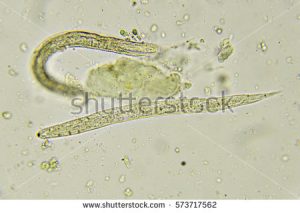What are Parasites?
According to the University of Maryland Medical Center, there are two primary forms of intestinal parasites — protozoa and helminths. Protozoa have only a single cell and can multiply once inside the body, possibly resulting in serious infections. The most commonly found protozoa include cryptosporidum and giardia. Helminths, which have multiple cells, cannot multiply once they reach their adult state. Parasites such as pinworms, roundworms and tapeworms are well-known helminths found in the U.S.
How can someone get parasites?
The transmission of parasites occurs primarily during contact with infected fecal matter, most likely in the soil, water or food system. Your risk of exposure to parasites can also increase by visiting areas where such parasites are known to exist, visiting or traveling through infected areas, visiting areas with poor sanitation, or utilizing poor hygiene. People with known weakened immune systems should exercise great caution as they are at much higher risk, as well as those with HIV or AIDS. Children and the elderly are particularly at risk, especially when enrolled or in residency at child care or institutional care centers. Since they can survive in the human intestines for months or even years without noticeable symptoms, many people live with them unknowingly for great lengths of time. Becoming aware of the possible symptoms of a parasitic invasion brings us one step closer to being rid of them — and back in our proper health. Let’s take a peek at some of the most common symptoms of parasites.
Symptoms of Parasites
The Medical Center advises that symptoms to consider as connected to possible parasites include: diarrhea and vomiting, nausea, abdominal pain or soreness, dysentery, a rash or itching/irritation around the vulva or rectum, bloating or gassiness, fatigue, unexplained weight loss, or a worm visibly passing your stool. Wellness Mama adds numerous additional possible symptoms to this list, including but not limited to: repeated illness, repeated yeast infections, recurrent bladder infections, sores on the lips/mouth, white spots inside the mouth, rashes or itching/irritation around the genitals of either gender, intestinal cramps, endometriosis, eczema or psoriasis, toe fungus, athlete’s foot, sensitivity to food, smells or chemicals, allergies, strange cravings for sweet or starchy foods, brain fog, menstrual irregularities, anxiety or depression, spots or “floaters” over the eyes, a history of antibiotic, steroid or contraceptive use, muscle or joint aches, or constipation.
How can Parasites be Treated?
For anyone who believes they may have parasites, a doctor’s visit is paramount. Once your symptoms are considered, as well as any travel outside the country or weight loss, etc., the doctor will probably run some tests to determine whether you are infected. These tests may include stool sample examination (try to get the samples before ingesting any antibiotics or other such drugs and before any x-rays are taken.) Your doctor may need to do more than one stool sample to get an accurate result. Some doctors may be able to see pinworms by using scotch tape pressed to the anus a few times and then looking at the tape with a microscope.
Standard treatment options include prescribed medication from your doctor which is most effective at killing your particular parasite. Depending upon what you have, the length of prescription can vary up to several weeks. Doctors may recommend limiting or avoiding certain foods or products to prevent the existing parasites from growing. Simple carbohydrates of all kinds including refined food, sugars, fruits and fruit juice, and all dairy products should likely be avoided. Increased garlic is often advised, as well as additional fiber, probiotics, vitamin C, zinc, pomegranates, beets, carrots, or pumpkin seeds.
Other natural remedies can be effective as well, and include diatomaceous earth, removing all sugar (including fruit and honey) and dairy from the diet for up to two weeks, increased sweating, apple cider vinegar (start with a teaspoon in water 3x daily 30 minutes before eating), coconut oil, cinnamon, vitamin C, olive oil, various herbs, and garlic treatments (see Wellness Mama website for more details on each natural remedy).
Use Caution and Take Good Care of Yourself While Under Treatment
If you are under a doctor’s care and plan to take alternative remedies or herbs, please contact your doctor first, as sometimes there can be interference with medications or other unknown side effects when taking things together.
Since the body is under stress when healing from parasites, Wellness Mama instructs that people will need extra rest and should avoid unnecessary exposure to toxins while keeping up healthy sleep patterns, daily exercise and good dietary habits. She also recommends an occasional Epsom bath to help remove toxins through the skin.

